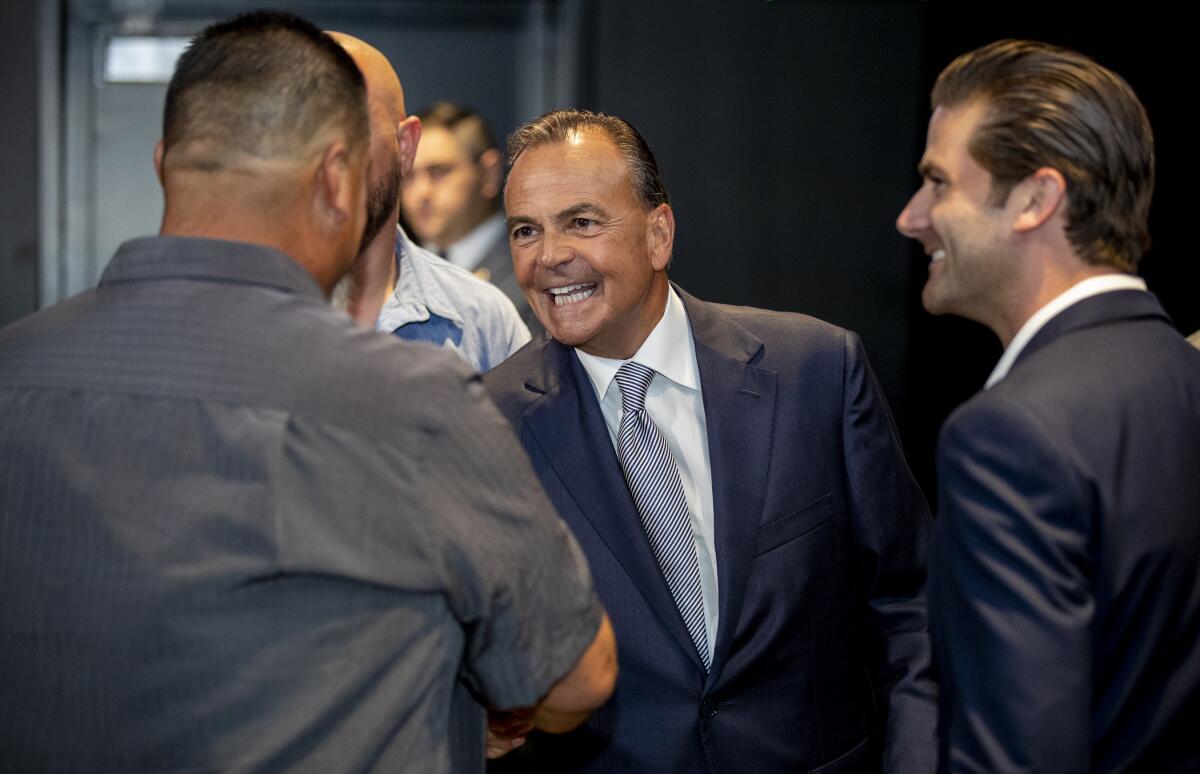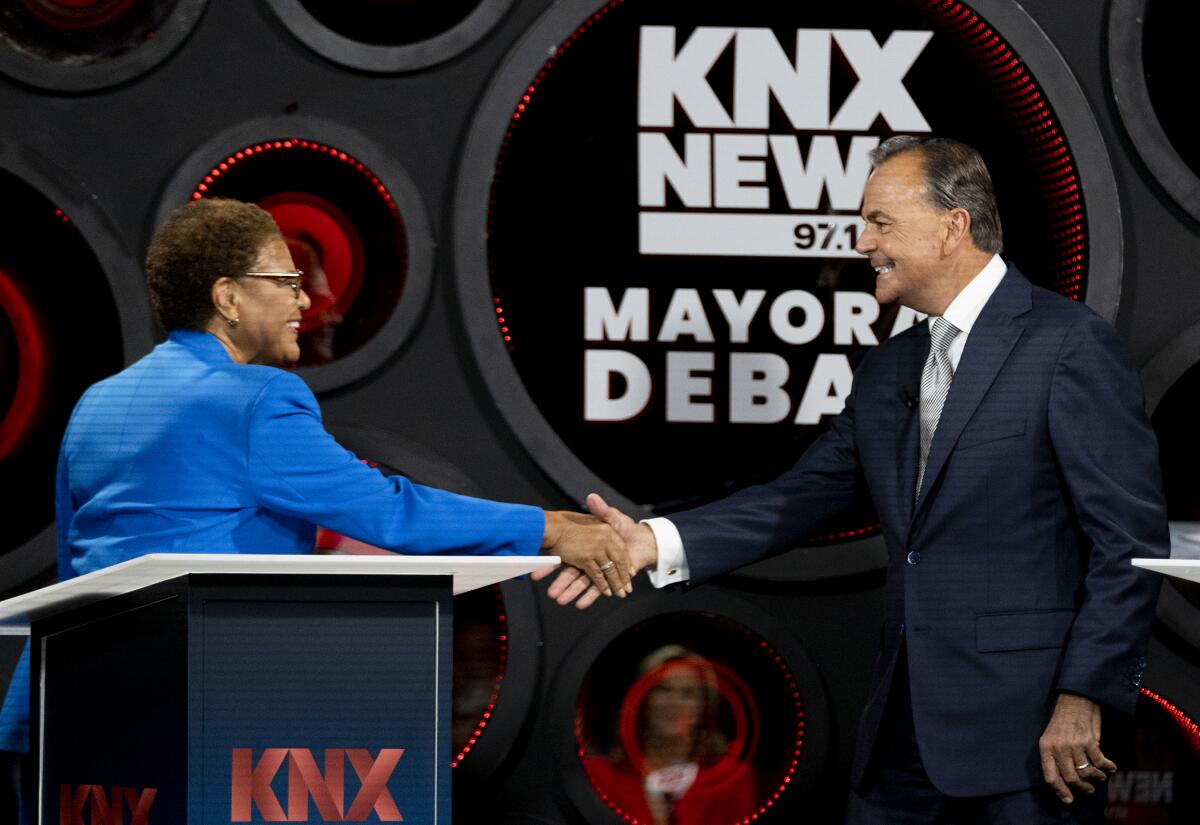L.A. on the Record: Asian Americans’ rising political power in L.A.

- Share via
Good morning, and welcome to L.A. on the Record — our local elections newsletter. It’s Jeong Park here making a guest appearance with some help from Ben Oreskes and others.
Get the lowdown on L.A. politics
Sign up for our L.A. City Hall newsletter to get weekly insights, scoops and analysis.
You may occasionally receive promotional content from the Los Angeles Times.
The Los Angeles Korean Festival, held annually in late September at Koreatown’s Seoul International Park, often feels like a hodgepodge of everything Korean.
One day, Dodgers legend Chan Ho Park was urging Korean Americans to support the San Diego Padres’ Ha-Seong Kim. Rural cities and provinces of South Korea set up booths promoting such delicacies as fermented squid. (Don’t knock it until you’ve tried it.) Korean celebrity Kim Heung-gook belted out a song and danced as if he was trying to keep his balance in an earthquake.
But the festival is also a symbol of the growing political power of Korean and other Asian Americans in Los Angeles and Southern California. It was evident on the Saturday afternoon of the Korean Festival parade, when mayoral candidate Rick Caruso — wearing a pink flower necklace and seated next to a corgi — took a ride in a horse-drawn carriage along Olympic Boulevard. He was one of two grand marshals.
His rival, Rep. Karen Bass, also appeared at the festival, taking photos with Korean community leaders.
It’s nearly a cliché now to say Asian American voters matter in L.A. The community is the fastest-growing ethnic group, making up nearly 1 in 10 voters in the city. Candidates are paying attention — Caruso held a conversation in Historic Filipinotown on Tuesday with Asian Americans and Pacific Islanders who are members of the entertainment community, and on Friday, Bass met with residents of Cathay Manor apartments in Chinatown.
“She has the heart for the people,” said King Cheung, an activist with Chinatown Community for Equitable Development, of Bass at her event on Friday. “Caruso is just building and building, and all those years, he hasn’t built one affordable housing.”
The question is: Who’s winning over the community?
It’s hard to know. Covering Asian Americans is like covering 25 communities at once, each with its own history, culture and interests.
“It’s a dynamic population,” said Paul Mitchell, a political data expert. “Westside gay Asian isn’t going to vote for Caruso.”
But a recent poll by the UC Berkeley Institute of Governmental Studies, co-sponsored by The Times, provides some clues. It shows Caruso leading Bass by a whopping 23 points, 51% to 29%, among likely Asian American voters in the city. Yes, the sample size is small. But even some supporters of Bass acknowledge that Caruso’s campaign has made significant inroads into the community.
“I will give the Caruso campaign a lot of credit in that he spent a considerable amount of money on targeting Asian voters, especially with in-language mailers,” said Andrew Murphy, the president of the Asian Democrats of L.A. County, which endorsed Bass. “We welcome those types of efforts in any race. ... But we also acknowledge there is a fundamental fundraising imbalance.”
Caruso, with his more than $70-million war chest, simply has more money to advertise in different languages, such as Korean. Over the last few months, Caruso’s campaign also had spent nearly $10 million on canvassing, prioritizing Latino and Asian voters as well as voters in the San Fernando Valley.
Given that many political parties and candidates have historically not done a good job meeting directly with the community, Caruso’s canvassing — and, yes, even parading in a horse-drawn carriage — matters, said Sara Sadhwani, an assistant professor of politics at Pomona College who specializes in Asian American voting behavior.
In an election that is as much about turnout as persuasion, getting people to vote who haven’t traditionally done so matters, Mitchell said.
But it’s not just Caruso’s money that has swayed Asian Americans. His campaign’s emphasis on helping small businesses and addressing crime can play very well in the community, Sadhwani said. Although Asian Americans see racial bias in policing, a recent survey from Loyola Marymount University found that nearly 80% of Asian Americans polled wanted to see more LAPD officers patrolling their neighborhood.
At a news conference on Thursday after the fatal stabbing of Du Young Lee in the garment district, Euny Cho called for more police presence in the area. Although Cho does not live in Los Angeles, as a garment manufacturer who has been in the area for nearly three decades, she said she had increasingly felt unsafe.
“If they [police] go around at least twice a day ... I think it will be awesome,” Cho said. “There’s one very easy, simple solution.”
It remains to be seen whether that sentiment could sway Asian Americans to vote for Caruso, or whether Asian American voters will even make a difference in the end. Still, winning the community is a necessity for Caruso, said Fernando Guerra, director of Loyola Marymount’s Center for the Study of Los Angeles.
“The only reason he even stands a small chance is because of his outreach to Asian and Latino communities,” Guerra said. “If Caruso is going to win, he has to win a majority of the Asian vote. ... If he doesn’t, he has no chance.”

State of play
— DEBATE HIGHLIGHTS: This week brought the second face-off between the mayoral candidates. It came as new polling from The Times showed a tightening contest, and this debate, hosted by KNX News, was far spicier than the first. Bass punched harder out of the gate, calling Caruso a liar with unrealistic plans — to address homelessness or increase the size of the Los Angeles Police Department — that sound good on paper, she said, but are unattainable.
“When you lie to people and say that you’re going to do these expensive things that you know good and well you can’t do, that creates the cynicism within voters,” she said to her opponent. “So even though you’ve never been elected to office, unfortunately, you have been displaying some of the worst tendencies of what they say about elected officials.”
The rhetorical daggers flew fast and furious the other direction as well. Caruso aimed to characterize the congresswoman as lacking judgment and having little to show for her time in Washington, D.C. He also hit Bass hard on her involvement with Scientology. He said that her decision to give a speech at one of its facilities reflected poorly on her integrity as a leader.
“It’s about credibility. It’s about character. It’s about judgment,” Caruso said.
Bass said that, in hindsight, she wouldn’t have gone to the event.
“I certainly knew of some of Scientology’s abuses,” she said. “I didn’t know the depth of them. I learned it later.”
— THE POLITICS OF DOBBS: Abortion and a 15-year-old Los Angeles magazine profile of Caruso came up at the debate as well. Spectrum News anchor Giselle Fernández pushed Caruso on his previous position on abortion rights, citing the 2007 magazine article that paraphrased his views on the subject to say he “opposes abortion in most cases but would support some stem cell research.”
Caruso appeared to contend that the article was inaccurate, saying he was speaking about stem cell research and citing another quote from the article in which he spoke about the government staying out of people’s private lives.
“Los Angeles magazine has now and had then a very rigorous fact-checking process,” Ed Leibowitz, the article’s author, told The Times on Thursday night. “Everything in the article was fact-checked, including that.”
The subject is an anvil of sorts around Caruso’s neck and forces him to stray from the centerpieces of his campaign, which are homelessness, corruption and public safety. As an example this week, we were reminded by Bass that Caruso had pledged $1 million to support the ballot measure now known as Proposition 1, which would enshrine abortion rights in the state Constitution.
“Has anybody seen the $1 million?” Bass said Monday. Caruso’s team says he still plans to support the measure, but it’s a reminder of how animated Bass supporters appear to be about reproductive rights in this race.
— THE CAVALRY COMES: Hollywood executive Jeffrey Katzenberg donated $1 million on Wednesday to Communities United for Bass for LA Mayor 2022, pushing his total contributions to the group to about $1.85 million. The pro-Bass group has raised almost $5 million since the start of the year. A new and separate pro-Bass political action committee led by the Southwest Regional Council of Carpenters took in more than $2 million in contributions in recent weeks. This largesse, on top of the $6 million her campaign spent through the last filling period, pales in comparison with the more than $62 million Caruso has poured into his campaign since jumping into the race.
— DUKING IT OUT IN THE VALLEY: Although the L.A. mayoral race has been grabbing attention, Bob Hertzberg and Lindsey Horvath have been battling it out for a seat on the county Board of Supervisors, “upping the rhetoric by criticizing each other’s experience levels and differences,” the Los Angeles Daily News reports.
— CONTROVERSY IN CD 11: Spectrum’s Kate Cagle reports that Council District 11 candidate Traci Park defended the city of Anaheim in a 2021 lawsuit when a Black employee sued the city over a supervisor’s alleged use of the N-word. Park told Spectrum, “I don’t condone the use of racially offensive slurs.”
And in non-campaign news ...
— EVICTION MORATORIUM UNDONE: After nearly three years of COVID-19 emergency restrictions, landlords will once again be allowed to evict tenants who have fallen behind on their rent, the L.A. City Council decided Tuesday. The unanimous vote allows the eviction protections, some of the longest-lasting in the country, to end starting Feb. 1.
Enjoying this newsletter? Consider subscribing to the Los Angeles Times
Your support helps us deliver the news that matters most. Become a subscriber.
Quick hits
- Who’s running the city? Still Eric Garcetti. His confirmation as ambassador to India awaits a Senate vote, but one of his subordinates was named the first-ever U.S. State Department special envoy for linking local governments to national foreign policy. Nina Hachigian, 55, has served as the Los Angeles deputy mayor for international affairs under Garcetti since 2017. Before that, she was a State Department diplomat assigned to the leading Asian alliance, the Assn. of Southeast Asian Nations.
- The latest in mayoral endorsements: Caruso picked up the backing of the Daily News editorial board. U.S. Sen. Bernie Sanders (I-Vt.) endorsed Bass this week.
- And other city endorsements: The Sierra Club Angeles Chapter, West Hollywood Mayor Pro Tempore Sepi Shyne and WeHo City Councilmember John M. Erickson endorsed Hydee Feldstein Soto for L.A. city attorney. Council District 11 candidate Erin Darling got the backing of Marianne Williamson.
(If you have an endorsement you’d like to flag for next week, please send it to us.)
- On the docket for next week: KNBC will host another televised mayoral debate at 7 p.m. Tuesday.
Stay in touch
That’s it for this week! Send your questions, comments and gossip to LAontheRecord@latimes.com. Did a friend forward you this email? Sign up here to get it in your inbox every Saturday morning.
Sign up for Essential California
The most important California stories and recommendations in your inbox every morning.
You may occasionally receive promotional content from the Los Angeles Times.








